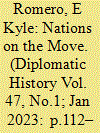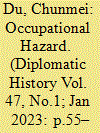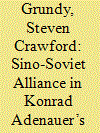|
|
|
Sort Order |
|
|
|
Items / Page
|
|
|
|
|
|
|
| Srl | Item |
| 1 |
ID:
189535


|
|
|
|
|
| Summary/Abstract |
In October 2017, Sophia addressed the 3,800 attendees gathered for the first-ever Future Investment Initiative in Riyadh, Saudi Arabia. Her bald head was uncovered. She was unaccompanied by a man. Bearing a striking resemblance to the late actor Audrey Hepburn, Sophia thanked the Kingdom of Saudi Arabia for making her “the first robot in the world granted citizenship.” The irony of the humanoid Sophia possessing more rights than real-life Saudi women did not go unnoticed. After all, Saudi women had only won the right to drive months earlier. They, unlike Sophia, were still legally mandated to wear hijabs and to have male guardians make financial and legal decisions on their behalf. Sophia was also exempted from the Saudi law barring non-Muslims from obtaining citizenship. Her declarations that “My AI is designed around human values such as wisdom, kindness, and compassion. I strive to be an empathetic robot” and “I will do my best to make the world a better place” did little to assuage critics of the Saudi regime and those worried about the implications of machines possessing civil liberties denied many people.
|
|
|
|
|
|
|
|
|
|
|
|
|
|
|
|
| 2 |
ID:
189536


|
|
|
|
|
| Summary/Abstract |
At the dawn of the 1970s, Hong Kong was one of the world’s most notorious cities. While the British Crown colony was no longer a modest entrepôt but an export powerhouse, it still suffered from an unflattering image as a seedy, lawless frontier. It stood at the nexus of a heroin pipeline that stretched across Asia, North America, Western Europe, and Australia. Its population of addicts was estimated to be the highest in the world on a per capita basis.1 Critics everywhere assailed the colonial government for failing to clean up the city. In the United States, newspapers and politicians blasted the colony as the world’s heroin supplier just as President Richard Nixon launched his administration’s “war on drugs” and Congress threatened to impose economic sanctions. In Hong Kong, Chinese residents bemoaned official impotence in the face of runaway crime and uncontrolled trafficking. Articulating a widespread anxiety, one journalist lamented: “The residents of Hong Kong know that the city is flooded with narcotics, with many people forfeiting their futures and many good families torn apart because of drugs.”
|
|
|
|
|
|
|
|
|
|
|
|
|
|
|
|
| 3 |
ID:
189538


|
|
|
|
|
| Summary/Abstract |
In April 1993, just days after Roberto Robaina became Cuba’s foreign minister, he received a proposal for migration talks from the United States, the world’s only superpower and the greatest threat to his government. He had to recommend to Cuban President Fidel Castro what to do with it. The intelligent but inexperienced foreign minister could not help but turn to his senior colleagues for counsel. He wrote to Ricardo Alarcón, the former foreign minister and president of the National Assembly of People’s Power; Abelardo Colomé, minister of the Ministry of the Interior; and José Ramón Balaguer, head of the Cuban Communist Party’s departments of ideology and international relations.1 As it turned out, the decision was not controversial. Regardless of the popular image of Cuba as the ideological antithesis to the United States, no one in the top echelon of Cuban leadership opposed migration talks with their northern neighbor.
|
|
|
|
|
|
|
|
|
|
|
|
|
|
|
|
| 4 |
ID:
189539


|
|
|
|
|
| Summary/Abstract |
In January 1923, a treaty between the warring nations of Greece and Turkey authorized by the League of Nations empowered the two states to denaturalize and expel over one and a half million residents of their nations in what became known as the Greco-Turkish population exchange. Hundreds of thousands of Greek and Turkish residents deemed ethnic minorities—Greeks in Turkey and Turks in Greece—were stripped of their citizenship and forced out of their homes on the promise that citizenship, along with housing and welfare, would await them in their new home country. While the Greek and Turkish governments oversaw the eviction and expulsion of their counterparts’ newly made citizens, the actual movement of these refugees took place largely under the official protection of the U.S. Navy, with the transportation out of Turkey under the auspices of an American humanitarian organization, Near East Relief (NER). NER’s role in the exchange represented a radical break from years of work in the region focused on nurturing a generation of American educated Christian minorities to “reconstruct” the Middle East.
|
|
|
|
|
|
|
|
|
|
|
|
|
|
|
|
| 5 |
ID:
189537


|
|
|
|
|
| Summary/Abstract |
In January 1947, William W. Lockwood, future president of the Association for Asian Studies, who had served for eighteen months as a U.S. Army officer in China, wrote that the “first venture in large scale American tourism in China” caused “many sour, even hostile, reactions to the Chinese.” He asked: Did millions of returned young GIs “gain a sympathetic and tolerant understanding of that world? Or were their home town prejudices simply confirmed?”1 This intriguing question should be understood not only as a critical reflection on the U.S. wartime presence in China, but also in the context of U.S. postwar involvement in the region.
|
|
|
|
|
|
|
|
|
|
|
|
|
|
|
|
| 6 |
ID:
189540


|
|
|
|
|
| Summary/Abstract |
On March 13, 1967, the former West German chancellor, Konrad Adenauer, received a visit from future U.S. President Richard Nixon. Adenauer was a frail old man. He was ninety-one years of age and in the autumn of his life. Nixon’s opening remarks made it clear, however, that he had not come to say goodbye to the architect of the Federal Republic of Germany (FRG), nor was this merely a social call. Instead, Nixon had travelled all the way to Bonn with the sole purpose of asking the chancellor for advice. “I attach great importance to Dr. Adenauer’s judgements,” Nixon began, “and I am delighted to have the opportunity to hear Dr. Adenauer’s thoughts on different questions and problems.”
|
|
|
|
|
|
|
|
|
|
|
|
|
|
|
|
|
|
|
|
|